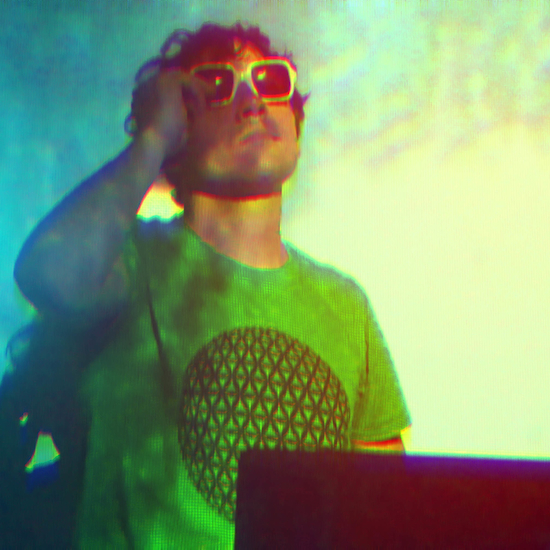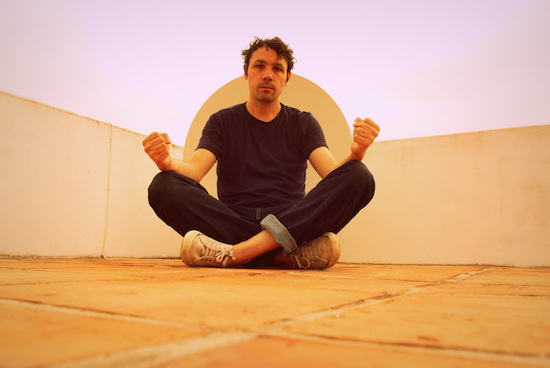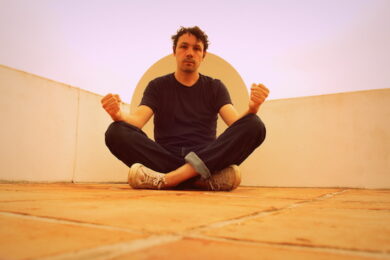As one half of Sculpture, Dan Hayhurst is involved in the pursuit of filling up the rift separating the senses and conventional art forms. Since the early ’00s, the audio-visual duo have been initiating psychic excursions, the outcomes of which are extremely fluid events. They are documented by a handful of releases for labels such as Software and Dekorder, as well as dozens of videos. Reuben Sutherland, Sculpture’s other half, has developed a distinct style of working turntables as visual instruments, triggering ḱaleidoscopic images, unique in their materiality and textural detail. Hayhurst does something akin – that is, with similarly lulling properties – by means of looping found tapes and digital sampling, contributing to this hybrid of constantly morphing techno-psychedelia. "Permutations" is what Hayhurst calls these sonic events, in which, essentially, stuff will endlessly trigger other stuff – a world of endless possibility, immersive and trippy.
Now Hayhurst’s thirst for adventure has led to the recording of his first solo outing, Critter Party. Sounding at least as anarchic as ever, it sees him adopt a somewhat more conventional instrumentation and new compositional methods.
We’re hurrying to a bar in East London ahead of a performance as the opening act for Grumbling Fur at Oslo when Hayhurst reveals he’s nervous: "I always worry that my instruments might break on stage." There’s not a hint of indecisiveness in his posture later on, however, as he adjusts the bottle of water he uses to hold his tape loops in place, bangs a sampler with his fists and shamelessly fiddles with all the knobs available like a manic incarnation of a superstar DJ at some rooftop party in Ibiza. He leaves the stage after unfurling a guitar solo that spirals off into unmapped rock & roll territory, an evocation of "genre" gone refreshingly wrong.
After being in a duo for so long, why do a solo release under your own name? Do you think of it as a personal statement?
Dan Hayhurst: I wouldn’t say necessarily it was a personal statement because what I’m wanting to do in music is dissolve my personality in it. So it’s continuing that quest. The answer to why it’s a solo album is almost random – it’s that Tim from LTR Records asked me to make a solo album. And I always think it’s more interesting to say yes than no. I’d been working on these pieces with a slightly different process. It was much more to do with performed instrumentation, guitars and percussion. And a lot less to do with finding samples or digging or that kind of thing. I thought that it might work quite well to focus it in that way.
Sculpture has always been two of you performing. You performed with Reuben for your record release party, but now you mostly play your shows alone. What’s that like? Is there a sense of feeling slightly naked?
DH: At the release party Reuben was actually drawing. He had made this big comic-strip artwork on the record sleeve – it’s a gatefold sleeve, quite lavish. So he was able to produce something that suggested a kind of narrative, as the music in some ways also suggests a narrative. It suggests a changing state. The artwork is also transformative, across this prog gatefold sleeve format.
Performing alone has a very different dynamic. I feel like it’s more direct, but maybe it’s just because it’s more focused on one sensory plane. What Reuben and I do as Sculpture is very direct, and actually there you can’t really separate the visuals from the audio. I do think of it as a bit of a tangent. Sculpture is the main focus of my work and I really enjoy working like that. But it is also really interesting working in this way where any visual aspect is purely imagined. But do I feel naked? No. It’s a bit riskier. They way that I work, especially live, is that there’s a lot of stuff that can go wrong. That’s how I like it. The exciting stuff comes from when it’s tipping off the side of the edge. There’s a lack of control. In theory, with Sculpture, if it did fall over the edge I could just watch for Reuben, whereas with this it’s like: "I really did fuck it up this time, terminally." Those things that are nerve-wrecking, but I think you can transform that into energy, that’s a good motor.
When and where did you record the album? Did you have any pre-conceived idea of what the album was going to be like?
DH: It was recorded mostly over summer 2015. It was recorded at Apiary Studios on Hackney Road [in London] where at the time I was renting some space with Reuben. I had an idea of the process I was going to use. It was this particular process with a reel-to-reel tape recorder. Not all, but most of the songs on the album were made like that. If you imagine a song is made up of four parts, I’d record the first part to the tape recorder, just playing some percussion or guitar or something. Then I’d record a second part trying to remember what the first part was like and playing something that I thought might work. And so on. You end up with a tape that’s maybe 20 minutes long with four or five different bits that might possibly work if you superimpose them. I just let them run and run and run until it locks in and it becomes interesting. Kind of like cogwheels. Most of the time they’re not meshing but sometimes they do and then they fall apart again. They kind of roll themselves.
In what way is that a different approach to when you produce music for Sculpture?
DH: I always try to encourage those accidents. I’m interested in unplanned congruences and in a lack of control. A lot of music that is produced now, you can hear that people really want to be in control. Computers can do the exact opposite, but not many people seem to explore that side of them. They seem to encourage you to want to control everything, to be the master of the material. It’s like they promise to index your creativity. Like Ableton Live, which I use for instance. It’s like a spreadsheet. It lists the different things and encourages that kind of indexing mentality. Whereas I want to fuck all of that up. I want to make mistakes and not know why something happened or where it came from. That’s what I’ve always been trying to do, with Sculpture as well.
For Sculpture I use these found tapes. I’m looking for the spirit of eBay to give me a great song. With the solo stuff, it’s less to do with finding in the car-boot sense and more to do with deranging my own output. But the intention is similar.
You’ve talked about your sound being the result of numerous permutations and an anagram is also a form of permutation. Did you know that "Try Trip React" is an anagram of "Critter Party" (as well as "Err Tract Pity" and "Tatter Rip Cry"). Would that be a fair assessment of your approach?
DH: In terms of reacting to stimuli, yeah, absolutely. I like to set up conditions where you have stuff happening that forces you to react. In a live show you have to react because it’s something that’s going to collapse. You have to kick it back into something that resembles music.
And tripping and trying is also involved… Well, tripping not so much these days. Trying, yeah. A lot of song titles tend to be anagrams. I went through a bunch of anagrams trying to find names for the songs on the album. I always do that at the end. I feel that it’s a nice way to do it because it relates to the process that you’ve identified. I don’t think I kept them, but they trigger other ideas.

Musically, it seems that one key change on Critter Party is that guitar sounds are a lot more prominent. Songs like ‘Unravelling’ or ‘Polyphase’ are practically guitar-driven. When did you start to include your guitar playing into your music?
DH: It’s guitar music, ‘Polyphase’ especially … I’ve always been a terrible guitar player. ‘Polyphase’ is an interesting example because I tried to use that method I talked about. I recorded it to the tape and tried to imagine things that might work with each other and then it was total shit. Then I flung them all into a sampler and I don’t really know what happened and ten minutes later that song was finished. When people think about guitar music they think in that mindset of developing technique and being competent at something, which I’m not and don’t want to be, particularly. It’s interesting to take guitars and do something that’s really trashy with them and see what happens. ‘Polyphase’ sounds like that coherent thing, it’s sounds like a band playing. But that’s just an emergent property of all those random processes. I mean, I must’ve done something, but I don’t know what. The way I approach using guitar is like I would approach using old bits of tape and samples. I don’t want to demonstrate my prowess. I don’t want to be the master of my instrument. But I think that it is a very direct means of communication. If you use a guitar, it’s a bit like if you sing. People will respond to it. I think I’m finding that some people are responding to this record that wouldn’t be remotely interested in Sculpture, because it’s kind of a guitar record. I’m always interested in making music that adopts a form, temporarily. So that there’s a recognisable genre trope there and then it changes again.
But you do make decisions constantly. And you did choose to press some stuff on to vinyl and then it stays in that form.
DH: Absolutely, I think if you look at purely algorithmic music, it rapidly is extremely boring. What’s required is human imagination. I think if you combine that kind of agency with the emergence that you can get from algorithms or from random processes then you get something that’s more than the sum of its parts. It’s like an entity and it has its own life. It sounds a bit pretentious but that’s how I think about songs. That’s why I called it Critter Party. Little creatures that’ve been given legs and they’ve walked off somewhere.
Very often the way I chose a tape, for instance, is I’d take a bunch of them, throw them in a dustbin and just pull stuff out at random, cut loops out. And for a very long time every fucking thing that I pulled out of that dustbin was amazing. I just felt like the universe was giving that to me. That period seems to have ended. [laughs] Everything’s rubbish now. But I’m patient enough to wait and see what happens. I’ve been doing this for a long time, I’m not really in a hurry. I’m not planning on stopping.
Is Critter Party your attempt to make an album that is more than a mere by-product? Are you trying to create something that is more durable perhaps?
DH: [Impersonates crazy professor] "It’s my monument!" It’s a monument, a least it is to me. But I don’t think it’s more "me" than the Sculpture stuff. The thing that I want to do most in my music is to dissolve myself in it. I want ego-death. That’s also what I want when I go to see music, I want to be disintegrated by it. Critter Party and Sculpture are just slightly different approaches to achieving the same thing. In a duo you have this communication that’s totally non-verbal. You can’t really do that on your own. I mean I kind of talk to the machines, but they don’t talk back. They sort of do talk back… [crazy professor voice] "I talk to the machines and they talk back!" They can relay a message. There’s all this stuff, all these tapes… and it makes something, it makes a communication. It’s a message that comes from an accumulated history. Especially now with the internet, there’s so much of this stuff. It’s like an ocean. People feel overwhelmed by it. But you can really fuck about with it. You have the power to engage with that creatively… That whole idea of psychedelic music is a playful response to your environment.
If you look at pop music, and I think that what I’m doing is pop music, I see what I do almost as part of trash culture, like rock & roll or something. It’s supposed to be disposable, it’s supposed to be a cheap thrill. I love that. You know, like I said that so much contemporary electronic music has this desire to control – I want to make dance music that has the aesthetic of garage punk.
The last time you talked to the Quietus, you mentioned you were working on a soap opera, The Department. Is that still going?
DH: Yeah, but it might take about 30 years. Because I was trying to make a soap opera out of cut-up dialogues. That was really labour-intensive. I had all these tapes of – that guy should never have sold them to me – he was a psychologist and he sold me a bunch of tapes that had a load of interviews on that he’d done. Not with patients. It was a research project about people that had moved to a particular environment, in the ’60s. They were talking about the place. It was yielding all these amazing descriptions and complaints about this place and then combining it with all these strange sounds. It gave a really strong impression of this institute of some kind. A lot of the things the people were saying were just so incredibly banal, it was very soapy. It’s ongoing, but don’t hold your breath.
Critter Party is out now on LTR Records



